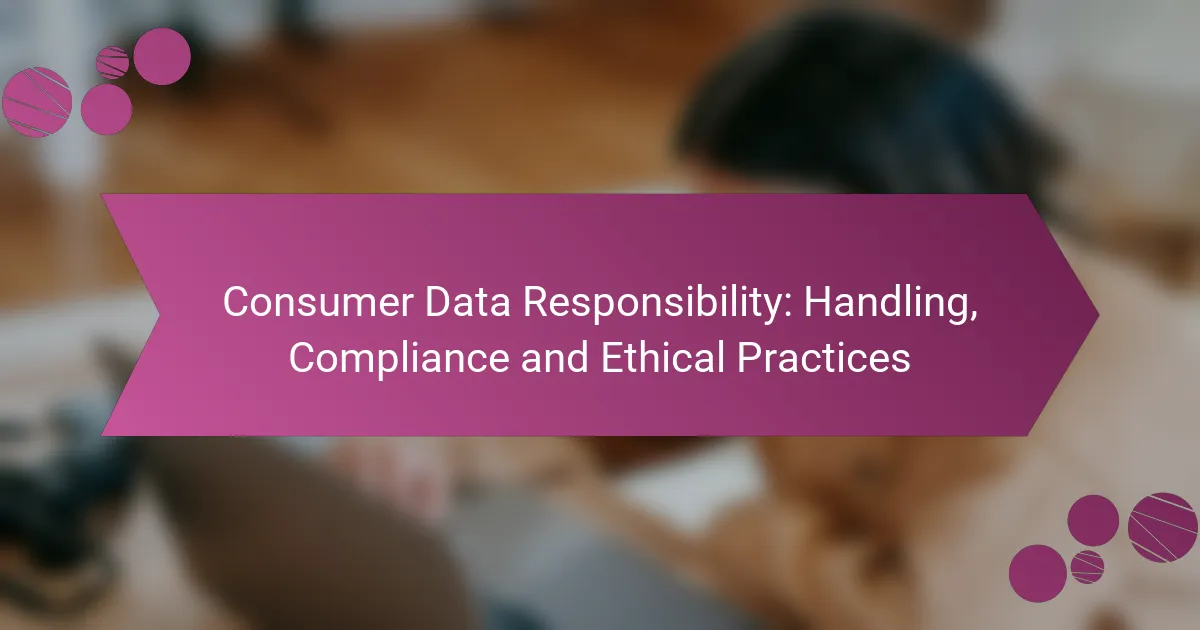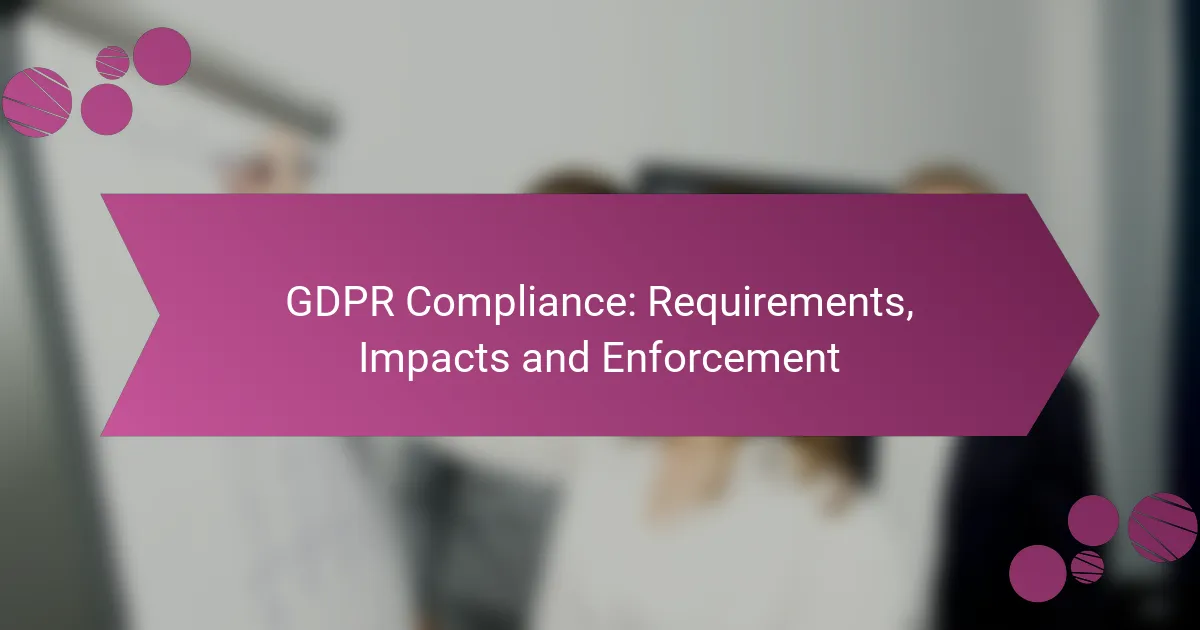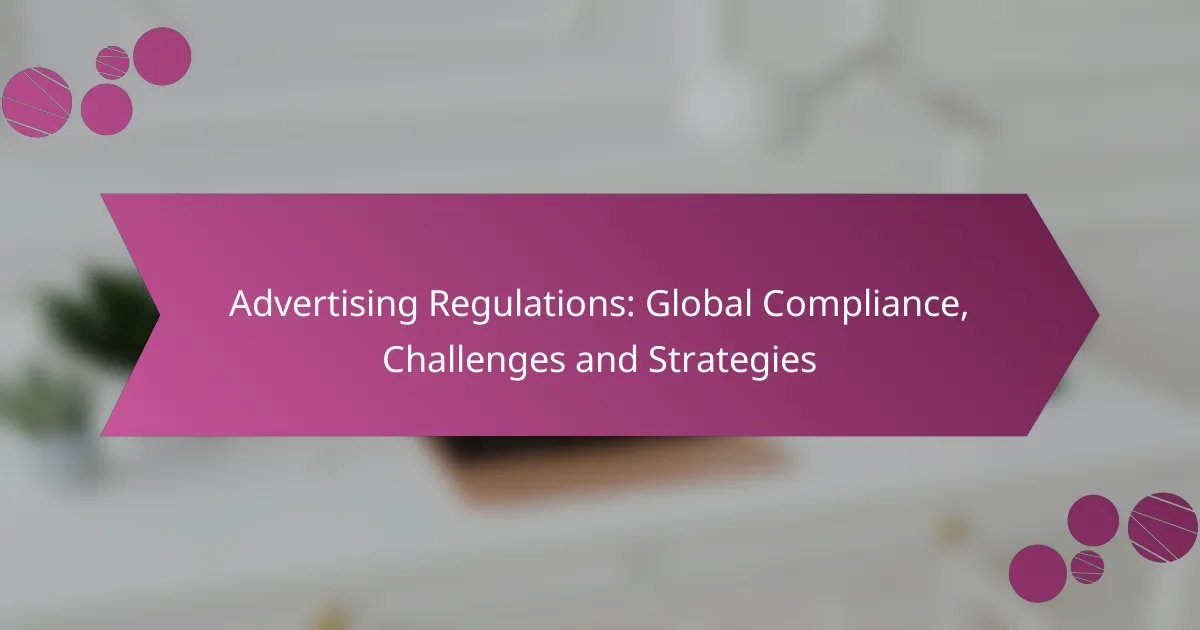In today’s digital landscape, responsible handling of consumer data is paramount for organizations aiming to comply with regulations and uphold ethical standards. In Ireland, best practices emphasize data minimization, informed consent, and robust security measures to protect consumer information. By understanding and implementing GDPR requirements, businesses can foster trust while effectively utilizing data for their objectives.
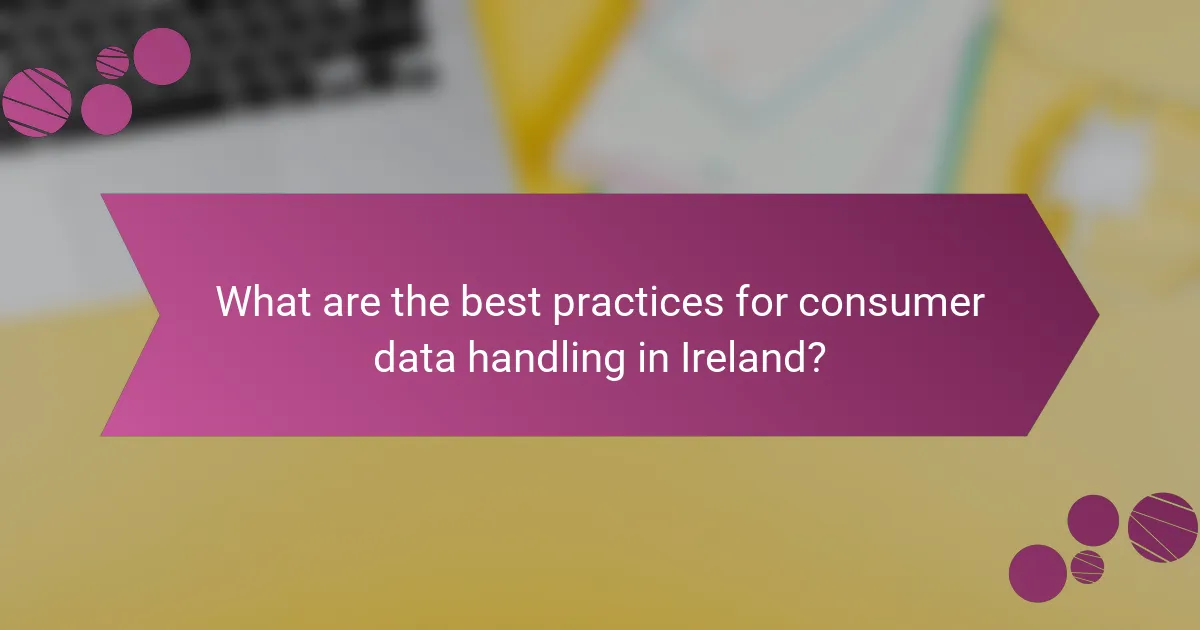
What are the best practices for consumer data handling in Ireland?
In Ireland, best practices for consumer data handling focus on ensuring compliance with data protection regulations while maintaining ethical standards. Key practices include data minimization, informed consent, data encryption, and regular audits to safeguard consumer information.
Data minimization
Data minimization involves collecting only the information necessary for a specific purpose. Organizations should assess their data needs and avoid gathering excessive details that could increase risks. For example, if a business only requires an email address for communication, it should not ask for additional personal information like phone numbers or addresses.
Implementing data minimization can reduce the potential impact of data breaches and enhance consumer trust. Regularly reviewing data collection practices helps ensure compliance with the General Data Protection Regulation (GDPR) standards.
Informed consent
Informed consent requires that consumers understand what data is being collected and how it will be used before they agree to share it. Organizations should provide clear, concise information about data processing activities, including any third parties involved. This transparency builds trust and ensures compliance with legal requirements.
To facilitate informed consent, companies can use straightforward language in their privacy policies and offer opt-in mechanisms that allow consumers to make choices about their data. Avoiding pre-checked boxes and providing easy ways to withdraw consent are essential practices.
Data encryption
Data encryption protects sensitive consumer information by converting it into a secure format that can only be accessed with a decryption key. This practice is crucial for safeguarding data during transmission and storage, particularly for personal and financial information.
Organizations should implement strong encryption protocols, such as AES (Advanced Encryption Standard), to ensure data security. Regularly updating encryption methods and training staff on data protection practices can further enhance security measures.
Regular audits
Conducting regular audits of data handling practices helps organizations identify vulnerabilities and ensure compliance with data protection regulations. Audits should assess data collection, storage, processing, and sharing practices to pinpoint areas for improvement.
Establishing a schedule for audits, whether quarterly or biannually, can help maintain accountability. Additionally, involving external auditors can provide an objective perspective and ensure adherence to best practices and legal requirements.
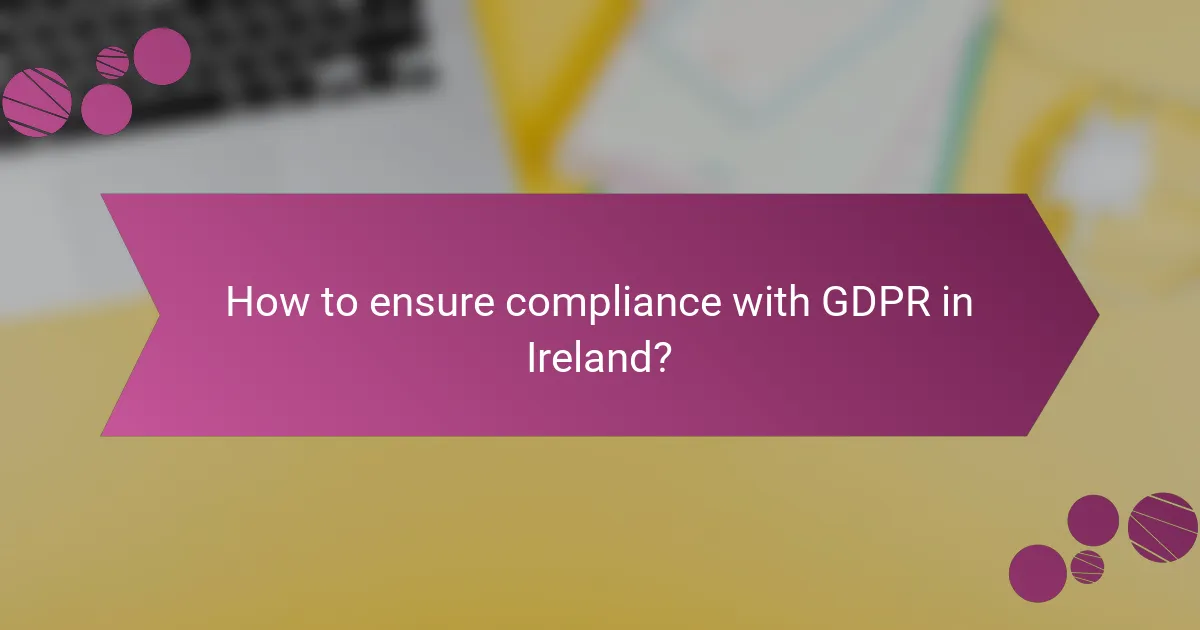
How to ensure compliance with GDPR in Ireland?
To ensure compliance with GDPR in Ireland, organizations must understand the regulation’s requirements, implement necessary assessments, and appoint a Data Protection Officer (DPO). These steps help protect consumer data and avoid significant fines.
Understand GDPR requirements
GDPR establishes strict guidelines for the collection and processing of personal data within the EU, including Ireland. Key principles include data minimization, purpose limitation, and ensuring transparency with data subjects about how their data is used.
Organizations must provide clear privacy notices, obtain explicit consent for data processing, and allow individuals to access or delete their data. Non-compliance can result in fines reaching up to 4% of annual global turnover or €20 million, whichever is higher.
Conduct Data Protection Impact Assessments
Data Protection Impact Assessments (DPIAs) are essential for identifying and mitigating risks associated with data processing activities. Organizations should conduct a DPIA when initiating new projects that involve personal data, especially when using new technologies.
A DPIA involves assessing the necessity and proportionality of data processing, evaluating risks to individuals’ rights, and outlining measures to mitigate those risks. This proactive approach not only ensures compliance but also builds trust with consumers.
Appoint a Data Protection Officer
Appointing a Data Protection Officer (DPO) is a critical step for organizations that process large volumes of personal data or sensitive information. The DPO is responsible for overseeing data protection strategies and ensuring compliance with GDPR.
The DPO should have expert knowledge of data protection laws and practices, and they must be independent, adequately resourced, and report directly to the highest management level. This role is vital for fostering a culture of data protection within the organization and acting as a point of contact for data subjects and regulatory authorities.
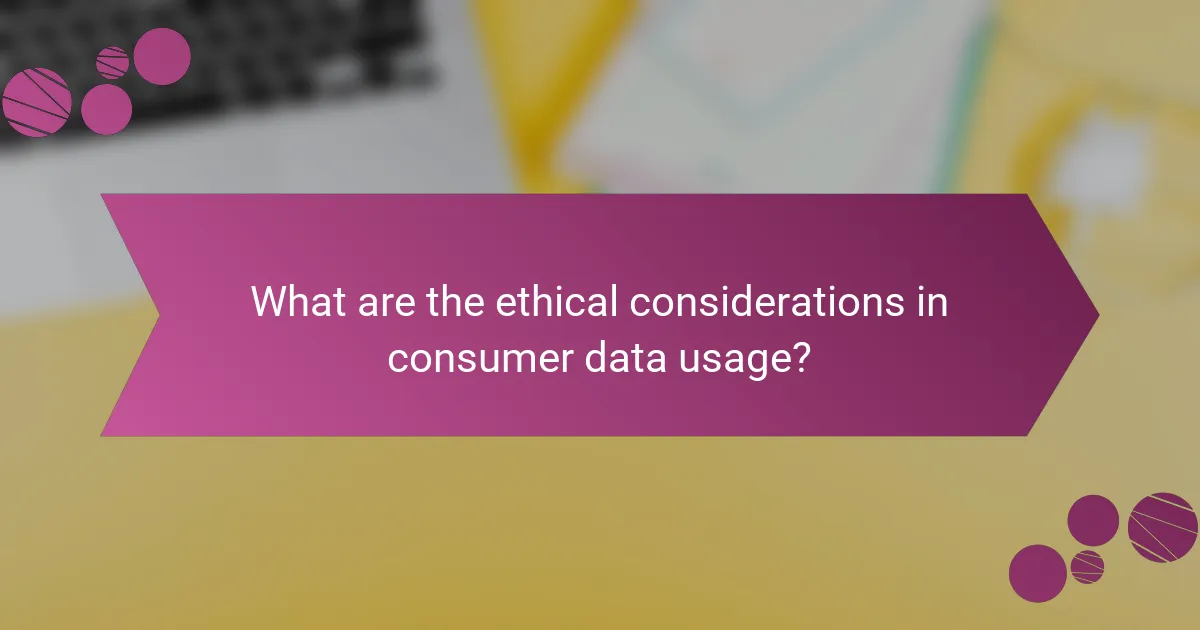
What are the ethical considerations in consumer data usage?
Ethical considerations in consumer data usage revolve around ensuring that data is handled responsibly, respecting individual privacy, and maintaining transparency. Organizations must navigate these aspects to build trust and comply with regulations while leveraging data for business purposes.
Transparency in data usage
Transparency in data usage involves clearly communicating to consumers how their data is collected, used, and shared. Companies should provide accessible privacy policies and updates, ensuring that consumers understand their rights and the implications of data sharing.
For example, organizations can implement user-friendly dashboards that allow consumers to see what data is being collected and how it is utilized. This practice not only fosters trust but also aligns with regulations like the GDPR, which emphasizes the need for clear consent.
Respecting consumer privacy
Respecting consumer privacy means safeguarding personal information and ensuring that data collection practices do not infringe on individual rights. Companies should adopt data minimization principles, collecting only what is necessary for specific purposes.
Implementing strong data protection measures, such as encryption and access controls, is crucial. Additionally, organizations should regularly review their data handling practices to ensure compliance with privacy laws and to address any potential vulnerabilities.
Accountability for data breaches
Accountability for data breaches requires organizations to take responsibility for protecting consumer data and to have clear protocols in place for responding to incidents. This includes timely notifications to affected individuals and regulatory bodies when breaches occur.
Establishing a comprehensive incident response plan can help mitigate damage and restore consumer trust. Companies should also conduct regular audits and risk assessments to identify potential weaknesses in their data security frameworks, ensuring they are prepared to handle breaches effectively.
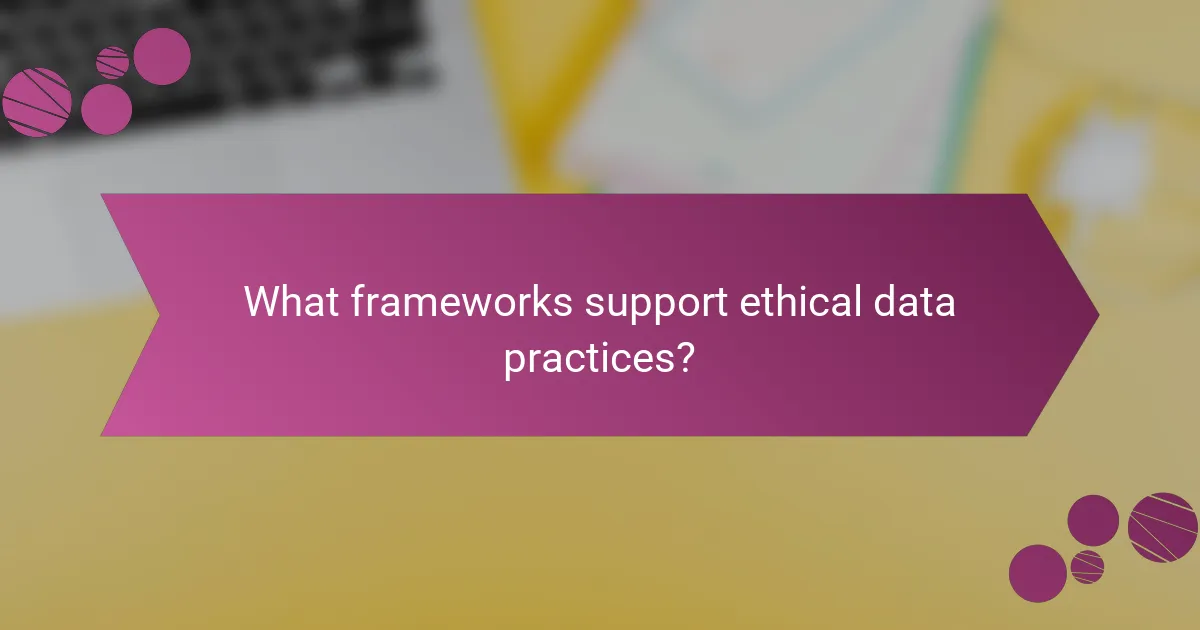
What frameworks support ethical data practices?
Several frameworks guide organizations in implementing ethical data practices, ensuring compliance and responsible handling of consumer data. These frameworks provide structured guidelines that help businesses navigate the complexities of data ethics and security.
ISO/IEC 27001 standards
The ISO/IEC 27001 standards are internationally recognized for establishing, implementing, maintaining, and continually improving an information security management system (ISMS). Organizations adopting these standards can effectively manage sensitive data and ensure its confidentiality, integrity, and availability.
To comply with ISO/IEC 27001, companies should conduct regular risk assessments, implement security controls, and maintain documentation of their data handling processes. This proactive approach not only mitigates risks but also builds trust with consumers.
Data Ethics Framework by the UK Government
The Data Ethics Framework developed by the UK Government provides guidance for public sector organizations on the ethical use of data. It emphasizes transparency, accountability, and the need to consider the impact of data practices on individuals and society.
Key principles include ensuring data is used fairly, maintaining privacy, and being clear about how data is collected and used. Organizations should regularly review their data practices against this framework to align with ethical standards and public expectations.
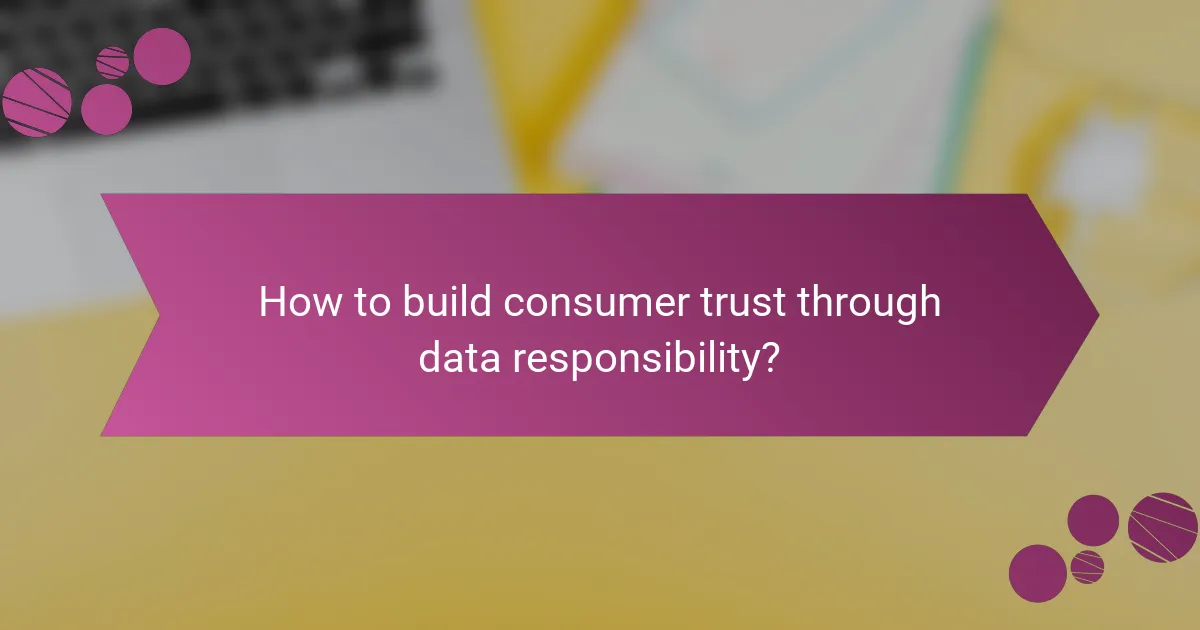
How to build consumer trust through data responsibility?
Building consumer trust through data responsibility involves transparent practices, clear communication, and active engagement with the community. By prioritizing ethical handling of consumer data, businesses can foster loyalty and confidence among their customers.
Clear privacy policies
Clear privacy policies are essential for establishing trust with consumers. These documents should outline how data is collected, used, and protected, ensuring that consumers understand their rights and the measures in place to safeguard their information.
Consider using straightforward language and avoiding legal jargon to make policies accessible. Regularly updating these documents in response to changes in regulations or business practices is also crucial. For example, if your company adopts new data-sharing technologies, reflect these changes in your privacy policy promptly.
Engagement in community discussions
Engaging in community discussions about data responsibility helps build trust and demonstrates a commitment to ethical practices. Companies can participate in forums, social media conversations, and local events to share insights and gather feedback on data handling practices.
Active participation not only showcases transparency but also allows businesses to address concerns directly. Hosting Q&A sessions or webinars can be effective ways to educate consumers about data privacy and security measures. This two-way communication fosters a sense of partnership between businesses and their customers, enhancing overall trust.
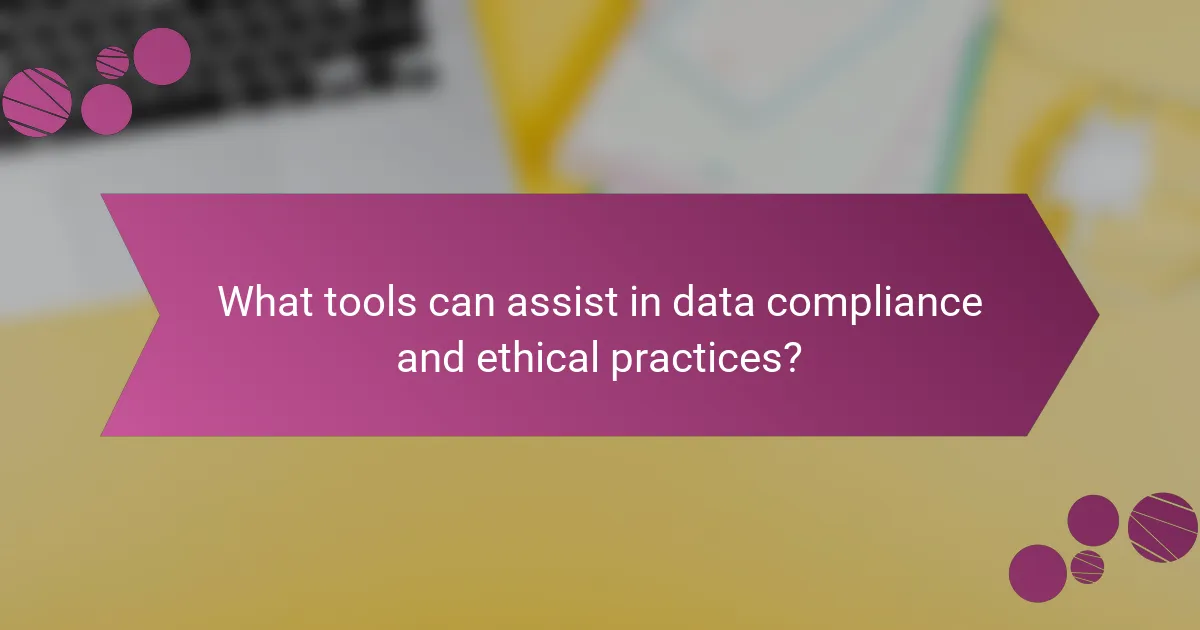
What tools can assist in data compliance and ethical practices?
Various tools can enhance data compliance and support ethical practices by streamlining processes and ensuring adherence to regulations. These tools often include software solutions for data management, privacy compliance, and risk assessment.
Data Management Platforms
Data management platforms (DMPs) help organizations collect, organize, and analyze consumer data efficiently. They enable businesses to maintain data integrity and ensure compliance with regulations such as GDPR or CCPA by providing features for data governance and security.
When selecting a DMP, consider factors like integration capabilities, scalability, and user-friendliness. Popular options include Adobe Experience Platform and Oracle BlueKai, which offer robust features for managing consumer data responsibly.
Privacy Compliance Software
Privacy compliance software assists organizations in adhering to data protection laws by automating processes related to consent management, data subject requests, and compliance reporting. These tools help ensure that businesses respect consumer privacy while minimizing the risk of non-compliance penalties.
Examples of privacy compliance software include OneTrust and TrustArc, which provide comprehensive solutions for managing privacy policies and tracking compliance efforts. Implementing such tools can significantly reduce the administrative burden associated with compliance.
Risk Assessment Tools
Risk assessment tools evaluate potential vulnerabilities in data handling practices and help organizations identify areas for improvement. These tools often include features for conducting audits, assessing third-party risks, and monitoring data breaches.
Using tools like RiskWatch or LogicManager can help businesses proactively manage risks associated with consumer data. Regular risk assessments are crucial for maintaining compliance and ensuring ethical data practices.





